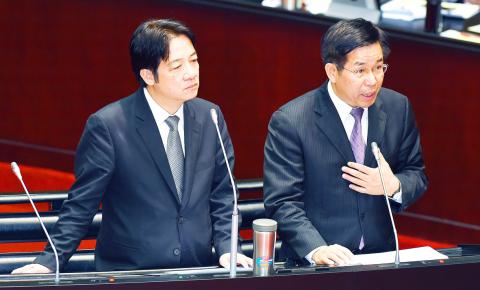The Ministry of Education is to comb through its Chinese-language idioms dictionary to remove any entry that might promote sexism, Minister of Education Pan Wen-chung (潘文忠) said yesterday, amid controversy over entries that have been criticized as shaming women’s bodies.
Pan made the remarks at a question-and-answer session at the legislature in Taipei, when he was asked by Democratic Progressive Party Legislator Yu Mei-nu (尤美女) what his thoughts were on two entries: “aircraft carrier” (航空母艦) and “washboard” (洗衣板).
According to the online dictionary, the term “aircraft carrier” is also used to describe “women with large bodies,” with the example: “Her figure is just like an aircraft carrier.”

Photo: Liao Chen-huei, Taipei Times
“Washboard” is a term used to describe “women with flat bosoms,” the dictionary said.
The entries sparked a torrent of criticism online after they came to light this week and received broad local media coverage, with critics calling the terms sexist and body shaming.
The entries were “very inappropriate,” Pan said, adding that they date to 2000, when the idioms were more commonly used.
The dictionary is used by about 50,000 people each day, Pan said, adding that it should be updated to be brought in line with today’s language usage.
As the idiom dictionary is the standard reference used by students of all ages when preparing for exams, entries with sexist connotations should be removed or explained with footnotes, Yu said.
The underlying sexism in education is indoctrinating, which could help explain the constant setbacks experienced by women’s rights groups when pushing for gender equality, she said.
The ministry is conducting a thorough review of the dictionary to make it more conducive to promoting gender equality, Pan said, adding that it would remove inappropriate or outdated entries in two weeks and add footnotes where it deems necessary.
The alternative explanation for “aircraft carrier” was yesterday marked as “derogatory,” and the example was removed.
The entry for “washboard” was also removed yesterday.

The Ministry of the Interior (MOI) is to tighten rules for candidates running for public office, requiring them to declare that they do not hold a Chinese household registration or passport, and that they possess no other foreign citizenship. The requirement was set out in a draft amendment to the Enforcement Rules of the Public Officials Election and Recall Act (公職人員選舉罷免法 ) released by the ministry on Thursday. Under the proposal, candidates would need to make the declaration when submitting their registration forms, which would be published in the official election bulletin. The move follows the removal of several elected officials who were

The Republic of China (ROC) is celebrating its 114th Double Ten National Day today, featuring military parades and a variety of performances and speeches in front of the Presidential Office in Taipei. The Taiwan Taiko Association opened the celebrations with a 100-drummer performance, including young percussionists. As per tradition, an air force Mirage 2000 fighter jet flew over the Presidential Office as a part of the performance. The Honor Guards of the ROC and its marching band also heralded in a military parade. Students from Taichung's Shin Min High School then followed with a colorful performance using floral imagery to represent Taiwan's alternate name

FOUR DESIGNATED AREAS: Notices were issued for live-fire exercises in waters south and northwest of Penghu, northeast of Keelung and west of Kaohsiung, they said The military is planning three major annual exercises across the army, navy and air force this month, with the navy’s “Hai Chiang” (海強, “Sea Strong”) drills running from today through Thursday, the Ministry of National Defense said yesterday. The Hai Chiang exercise, which is to take place in waters surrounding Taiwan, would feature P-3C Orion maritime patrol aircraft and S-70C anti-submarine helicopters, the ministry said, adding that the drills aim to bolster the nation’s offshore defensive capabilities. China has intensified military and psychological pressure against Taiwan, repeatedly sending warplanes and vessels into areas near the nation’s air defense identification zone and across

A Chinese takeover of Taiwan would severely threaten the national security of the US, Japan, the Philippines and other nations, while global economic losses could reach US$10 trillion, National Security Council Deputy Secretary-General Lin Fei-fan (林飛帆) wrote in an article published yesterday in Foreign Affairs. “The future of Taiwan is not merely a regional concern; it is a test of whether the international order can withstand the pressure of authoritarian expansionism,” Lin wrote in the article titled “Taiwan’s Plan for Peace Through Strength — How Investments in Resilience Can Deter Beijing.” Chinese President Xi Jinping’s (習近平) intent to take Taiwan by force